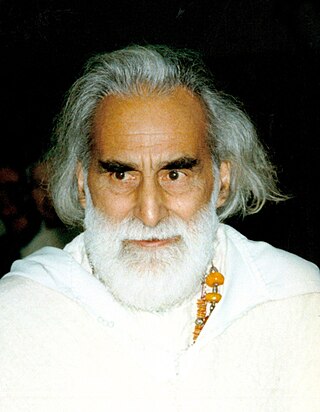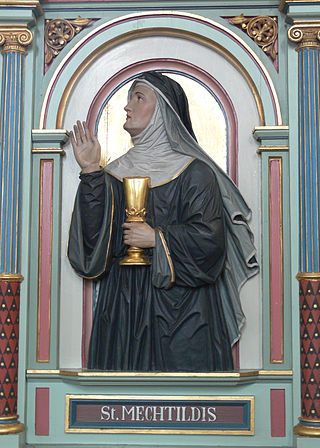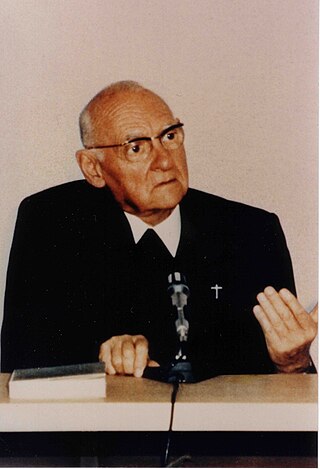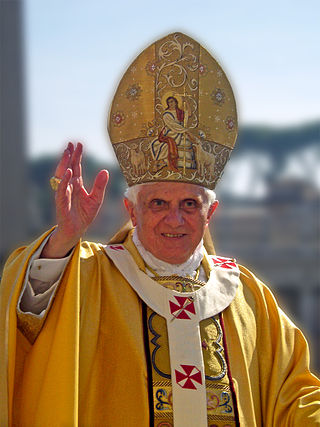Related Research Articles

Hildegard of Bingen, also known as Saint Hildegard and the Sibyl of the Rhine, was a German Benedictine abbess and polymath active as a writer, composer, philosopher, mystic, visionary, and as a medical writer and practitioner during the High Middle Ages. She is one of the best-known composers of sacred monophony, as well as the most recorded in modern history. She has been considered by a number of scholars to be the founder of scientific natural history in Germany.

Panentheism /pænenˈθiːɪzəm/ is the belief that the divine intersects every part of the universe and also extends beyond space and time. The term was coined by the German philosopher Karl Krause in 1828 to distinguish the ideas of Georg Wilhelm Friedrich Hegel (1770–1831) and Friedrich Wilhelm Joseph Schelling (1775–1854) about the relation of God and the universe from the supposed pantheism of Baruch Spinoza. Unlike pantheism, which holds that the divine and the universe are identical, panentheism maintains an ontological distinction between the divine and the non-divine and the significance of both.

Vilayat Inayat Khan was a teacher of meditation and of the traditions of the East Indian Chishti Sufi order of Sufism. His teaching derived from the tradition of his father, Inayat Khan, founder of The Sufi Order in the West, in a form tailored to the needs of Western seekers. One of his sisters was Noor Inayat Khan GC MBE. He taught in the tradition of Universal Sufism. His parents met at the New York City ashram of American yogi, Pierre Bernard, half-brother of his mother Pirani Ameena Begum.

Mechthildof Magdeburg, a Beguine, was a Christian medieval mystic, whose book Das fließende Licht der Gottheit is a compendium of visions, prayers, dialogues and mystical accounts. She was the first mystic to write in Low German.

Doctor of the Church, also referred to as Doctor of the Universal Church, is a title given by the Catholic Church to saints recognized as having made a significant contribution to theology or doctrine through their research, study, or writing.
Julia B. Cameron is an American teacher, author, artist, poet, playwright, novelist, filmmaker, composer, and journalist. She is best known for her book The Artist's Way (1992). She also has written many other non-fiction works, short stories, and essays, as well as novels, plays, musicals, and screenplays.

Christian mysticism is the tradition of mystical practices and mystical theology within Christianity which "concerns the preparation [of the person] for, the consciousness of, and the effect of [...] a direct and transformative presence of God" or Divine love. Until the sixth century the practice of what is now called mysticism was referred to by the term contemplatio, c.q. theoria, from contemplatio, "looking at", "gazing at", "being aware of" God or the Divine. Christianity took up the use of both the Greek (theoria) and Latin terminology to describe various forms of prayer and the process of coming to know God.

Lo! is the third published nonfiction work of the author Charles Fort. In it he details a wide range of unusual phenomena. In the final chapter of the book he proposes a new cosmology that the earth is stationary in space and surrounded by a solid shell which is "not unthinkably far away".

Hans Urs von Balthasar was a Swiss theologian and Catholic priest who is considered an important Catholic theologian of the 20th century. Pope John Paul II announced his choice of Balthasar to become a cardinal, but he died shortly before the consistory. Cardinal Joseph Ratzinger said in his funeral oration for Balthasar that "he is right in what he teaches of the faith" and that he "points the way to the sources of living water".

Leonardo Boff, born as Genézio Darci Boff, is a Brazilian theologian, philosopher writer, and former Catholic priest known for his active support for Latin American liberation theology. He is Professor Emeritus of Ethics, Philosophy of Religion, and Ecology at the Rio de Janeiro State University. In 2001, he received the Right Livelihood Award for "his inspiring insights and practical work to help people realise the links between human spirituality, social justice and environmental stewardship."
Brian Thomas Swimme is a professor at the California Institute of Integral Studies, in San Francisco, where he teaches evolutionary cosmology to graduate students in the philosophy, cosmology, and consciousness program. He received his Ph.D. (1978) from the department of mathematics at the University of Oregon for work with Richard Barrar on singularity theory, with a dissertation titled Singularities in the N-Body Problem.

Harvey Gallagher Cox Jr. is an American theologian who served as the Hollis Professor of Divinity at Harvard Divinity School, until his retirement in October 2009. Cox's research and teaching focus on theological developments in world Christianity, including liberation theology and the role of Christianity in Latin America.

John Michael Talbot is an American Christian musician, author, television presenter and founder of a monastic community known as the Brothers and Sisters of Charity.
Quietism is the name given to a set of contemplative practices that rose in popularity in France, Italy, and Spain during the late 1670s and 1680s, particularly associated with the writings of the Spanish mystic Miguel de Molinos, and which were condemned as heresy by Pope Innocent XI in the papal bull Coelestis Pastor of 1687. "Quietism" was seen by critics as holding that man's highest perfection consists in a sort of psychical self-annihilation and a consequent absorption of the soul into the Divine Essence even during the present life.

Scivias is an illustrated work by Hildegard von Bingen, completed in 1151 or 1152, describing 26 religious visions she experienced. It is the first of three works that she wrote describing her visions, the others being Liber vitae meritorum and De operatione Dei. The title comes from the Latin phrase Sci vias Domini. The book is illustrated by 35 miniature illustrations, more than that are included in her two later books of visions.

The Pope Benedict XVI bibliography contains a list of works by Pope Benedict XVI.

Eckhart von Hochheim, commonly known as Meister Eckhart, Master Eckhart or Eckehart, claimed original name Johannes Eckhart, was a German Catholic theologian, philosopher and mystic, born near Gotha in the Landgraviate of Thuringia in the Holy Roman Empire.
This is a bibliography of Hildegard of Bingen's works.

Derek Lin is a Taiwanese-American author in the Tao genre.
The cosmic Christ is a view of Christology which emphasises the extent of Jesus Christ's concern for the cosmos. The biblical bases for a cosmic Christology is often found in Colossians, Ephesians, and the prologue to the gospel of John.
References
- ↑ Pacwa, Mitchell. "Catholicism for the New Age: Matthew Fox and Creation-Centered Spirituality" (PDF). equip.org. Christian Research Institute . Retrieved June 16, 2021.
- ↑ Vallalongo, Fred; Vallalongo, Sally (March 28, 1993). "Matthew Fox confronts life outside the Catholic Church". The Toledo Blade. Retrieved January 14, 2023.
- ↑ Burack, Charles (July 2010). "Adventures in Creation Spirituality". Interreligious Insight. Vol. 8, no. 2. pp. 62–65.
- ↑ Martin Wroe (July 13, 1992). "Turbulent Priest Ministers to the New Age Soul: Martin Wroe Meets the Friar Delivering Pagan Heresy to Packed Churches". The Independent. Retrieved January 14, 2023.
- ↑ "Fascism in the Church: Ex-Priest on "The Pope's War," Clergy Abuse and Quelling Liberation Theology". Democracy Now!. February 28, 2013. Retrieved January 14, 2023.
- ↑ "Vatican Expels Factious Priest From Dominicans". Los Angeles Times. Religious News Service. March 6, 1993. Retrieved January 14, 2023.
- 1 2 Molly O’Neill (March 17, 1993). "A Supper with Matthew Fox; Roman Catholic Rebel Becomes a Cause Celebre". The New York Times .
- ↑ John L. Allen Jr. (February 21, 2003). "Vatican looks at 'New Age,' issues 'appeal to discernment'". National Catholic Reporter . Retrieved January 14, 2023.
- ↑ "Making a Joyful Noise: Rev. Matthew Fox Hopes His Sweaty Rave Masses Will Change the Way We Pray, Raving My Religion". New York Times Magazine. June 22, 1997.
- ↑ Fox, Matthew (1996). Confessions: the Making of a Postdenominational Priest. [San Francisco, Calif.]: HarperSanFrancisco. pp. 250. ISBN 0-06-062965-7.
- ↑ Rick DelVecchio (February 5, 1999). "East-West Naropa Institute Plans to Open in Oakland: Move is part of Jerry Brown's downtown plan". San Francisco Chronicle.
- ↑ "Wisdom University".
- ↑ Trenning, Lynn (September 18, 2010). "A Mystic Brings Lessons in Awe and Creativity: in Charlotte, Matthew Fox Will Share What He Thinks Today's Christianity Needs to Thrive". Charlotte Observer.[ dead link ]
- ↑ Watanabe, Teresa (November 3, 1998). "Seeking the Feminine in God / Goddess worship accentuates female origins of the Almighty". San Francisco Chronicle. Retrieved January 14, 2023.
- ↑ O'Neill, Molly (March 17, 1993). "At Supper With -- Matthew Fox; Roman Catholic Rebel Becomes A Cause Celebre". The New York Times. Retrieved March 8, 2013.
- ↑ O'Neill, Molly (March 17, 1993). "At Supper With—Matthew Fox; Roman Catholic Rebel Becomes A Cause Celebre". The New York Times.
- 1 2 Robert Brow (June 16, 1989). "The Taming of a New Age Prophet". Christianity Today.
- ↑ Cooper, John W. (2006). Panentheism, the Other God of the Philosophers: from Plato to the Present. Grand Rapids, Mich.: Baker Academic. ISBN 0-8010-2724-1. OCLC 69423262.
- ↑ Oman Shannon, Maggie (2001). The Way We Pray: Prayer Practices from Around the World. Internet Archive. Berkeley, CA: Conari Press. pp. 204–206. ISBN 978-1-57324-571-5.
- ↑ Fox, Matthew (February 14, 2006). A New Reformation: Creation Spirituality and the Transformation of Christianity. Inner Traditions/Bear. ISBN 978-1-59477-123-1.
- ↑ "Theologian nails 95 theses for a new Reformation". Ekklesia. December 15, 2015. Retrieved January 14, 2023.